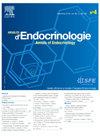ENDOCAN TUTHYREF网络一致建议:难治性滤泡源性甲状腺癌。
IF 2.9
3区 医学
Q3 ENDOCRINOLOGY & METABOLISM
引用次数: 0
摘要
放射性碘难治性分化甲状腺癌(RAIR DTC)占卵泡源性DTC的3-5%,在法国每年约有200-300例新诊断病例。法国RAIR DTC数据库的中位总生存期为9.5年,强调了对护理人员和患者的长期支持的重要性。为了指导治疗决策,法国ENDOCAN TUTHYREF网络提供了RAIR DTC管理算法,可在TUTHYREF网站上获得。本文总结了这些最近的实用建议,重点是5点。(1)长期以来,RAIR DTC被定义为局部晚期疾病,不适合手术治疗或转移性疾病,对放射性碘(RAI)治疗没有完全反应,这一定义可以进一步完善,考虑到预后因素。(2)治疗应根据肿瘤负荷和进展情况量身定制,对非进展或缓慢进展的疾病优先进行局部治疗。(3)早期肿瘤分子检测应识别驱动癌基因,如BRAF突变或RET/NTRK/ALK融合,以优化现有选择性靶向治疗的可及性。(4)对于症状性或进行性RAIR DTC,酪氨酸多激酶抑制剂,如索拉非尼,lenvatinib或cabozantinib,是标准治疗,但替代和二线激酶抑制剂也可用。(5)由于大多数治疗都伴有常见的副作用,如疲劳、心血管、消化和皮肤问题,准备和监测患者进行全身治疗应包括仔细评估合并症、毒性预防和个体剂量调整。总的来说,RAIR DTC的管理需要多学科的方法,强调个性化的治疗策略和积极的治疗教育。本文章由计算机程序翻译,如有差异,请以英文原文为准。
ENDOCAN TUTHYREF network consensus recommendations: Refractory follicular-derived thyroid cancer
Radioactive-iodine-refractory differentiated thyroid cancer (RAIR DTC) represents 3–5% of follicular-derived DTCs, with approximately 200–300 new cases diagnosed annually in France. Median overall survival in the French RAIR DTC database is 9.5 years, underscoring the importance of long-term support for caregivers and patients. To guide treatment decision-making, the French ENDOCAN TUTHYREF network has provided algorithms for RAIR DTC management, available at the TUTHYREF website. The present article summarizes these recent practical recommendations, focusing on 5 points. (1) RAIR DTC has long been defined by locally advanced disease not amenable to surgery or metastatic disease not fully responding to radioactive iodine (RAI) therapy, a definition that can be further refined considering prognostic factors. (2) Treatment should be tailored according to tumor burden and progression, with local treatments prioritized for non-progressive or slowly progressive disease. (3) Early tumor molecular testing should be performed to identify driver oncogenes such as BRAF mutation or RET/NTRK/ALK fusion, to optimize access to existing selective targeted therapies. (4) For symptomatic or progressive RAIR DTC, tyrosine multikinase inhibitors, such as sorafenib, lenvatinib or cabozantinib, are the standard therapies, but alternative and 2nd-line kinase inhibitors are also available. (5) Since most therapies are associated with common side-effects such as fatigue and cardiovascular, digestive and skin issues, preparing and monitoring patients for systemic therapy should include careful assessment of comorbidities, toxicity prevention and individual dose adjustment. Overall, management of RAIR DTC requires a multidisciplinary approach, with an emphasis on personalized treatment strategies and proactive therapeutic education.
求助全文
通过发布文献求助,成功后即可免费获取论文全文。
去求助
来源期刊

Annales d'endocrinologie
医学-内分泌学与代谢
CiteScore
4.40
自引率
6.50%
发文量
311
审稿时长
50 days
期刊介绍:
The Annales d''Endocrinologie, mouthpiece of the French Society of Endocrinology (SFE), publishes reviews, articles and case reports coming from clinical, therapeutic and fundamental research in endocrinology and metabolic diseases. Every year, it carries a position paper by a work-group of French-language endocrinologists, on an endocrine pathology chosen by the Society''s Scientific Committee. The journal is also the organ of the Society''s annual Congress, publishing a summary of the symposia, presentations and posters. "Les Must de l''Endocrinologie" is a special booklet brought out for the Congress, with summary articles that are always very well received. And finally, we publish the high-level instructional courses delivered during the Henri-Pierre Klotz International Endocrinology Days. The Annales is a window on the world, keeping alert clinicians up to date on what is going on in diagnosis and treatment in all the areas of our specialty.
 求助内容:
求助内容: 应助结果提醒方式:
应助结果提醒方式:


